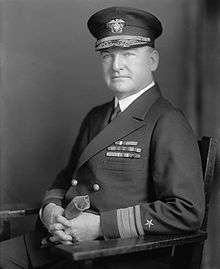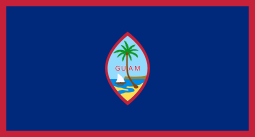Luke McNamee
Luke McNamee (April 4, 1871 – December 30, 1952)[1] was a United States Navy Admiral, businessman, and the 10th and 12th Naval Governor of Guam. He served in the Navy for 42 years, during which time he held multiple commands. During the Spanish–American War, he earned the Navy Cross, and later the Legion of Honour. Earlier on his career, he served as governor, and expanded funding for fighting the infectious diseases running through the native population. He represented the U.S. Navy as a delegate to the Paris Peace Conference in 1919. He later became Director of the Office of Naval Intelligence. He was promoted to full admiral after being placed in charge of the Battle Fleet. After this command, he served as President of the Naval War College before retiring in 1934. After leaving the Navy, he became President and Chairman of the Mackay Radio and Telegraph Company, where he aggressively expanded telegraph and radio service overseas.
Luke McNamee | |
|---|---|
 | |
| 21st President of the Naval War College | |
| In office June 3, 1933 – May 29, 1934 | |
| Preceded by | Harris Laning |
| Succeeded by | Edward C. Kalbfus |
| 21st Director of the Office of Naval Intelligence | |
| In office September 1921 – November 1923 | |
| Preceded by | Andrew T. Long |
| Succeeded by | Henry Hughes Hough |
| 12th Naval Governor of Guam | |
| In office October 3, 1907 – December 28, 1907 | |
| Preceded by | Templin Potts |
| Succeeded by | Edward John Dorn |
| 10th Naval Governor of Guam | |
| In office November 2, 1905 – December 3, 1906 | |
| Preceded by | George Leland Dyer |
| Succeeded by | Templin Potts |
| Personal details | |
| Born | August 4, 1871 Mount Hope, Wisconsin |
| Died | December 30, 1952 (aged 81) Newport, Rhode Island |
| Nationality | |
| Awards | Navy Cross Legion of Honour |
| Military service | |
| Allegiance | |
| Branch/service | |
| Rank | |
| Commands | |
Early life
McNamee was married to Dorothy Swinburne, daughter of Admiral William T. Swinburne, with whom he had no children.[2] For much of his life, he lived in Wisconsin, though he later moved to Jamestown, Rhode Island.[3]
Naval career
McNamee had a 42-year career in the United States Navy. He was appointed to the United States Naval Academy from Kansas, graduating in 1892.[2] He was commissioned as an ensign on July 1, 1894. He served two years aboard the training ship USS Atlanta before being transferred to the USS Essex, where he served from 1894 to 1898.[4] He became a lieutenant junior grade on March 3, 1899 and a lieutenant on July 1, 1900.[4] He served as executive officer of the USS Princeton during the Spanish–American War.[2] In 1901, he served aboard the battleship USS Oregon.[3] From 1905 to 1908, he was assigned to the Guam Naval Station, after which he served as the naval inspector to General Electric works in Schenectady, New York and Massachusetts and the navigator of the USS Nevada.[2][3] After serving as the first commanding officer of the USS Sacramento,[5] he was promoted to Captain in 1917. While on the Sacramento, he commanded all Navy forces in the Gulf of Mexico, though this only consisted seven gunboats.[6] After his promotion, he served as chief of staff to the commander of the United States Pacific Fleet, and then to Admiral William Sims, commander of United States Naval forces in Europe.[2] In 1919, he was on the naval advisory board at the Paris Peace Conference.[2]
In 1921, he served as commanding officer of the USS Nevada and the USS Tennessee in 1923. He served as Director of the Office of Naval Intelligence.[2] From 1924 to 1926, McNamee was appointed Naval attaché to the Court of St. James's in the United Kingdom. During his time in London, he was promoted to rear admiral.[2] In 1926, he commanded all the Destroyers in the Battle Fleet, before becoming director of fleet training. for the next four years. After being promoted to vice admiral, he returned to the Battle Fleet to command its Battleship force, doing so from 1931 to 1932. In 1933, he achieved full admiral and commanded the entire Battle Force.[2] On June 3, 1933, he became President of the Naval War College.[7] He left the post on May 29, 1934 after retiring from active duty.[8] During his career, he was awarded the Navy Cross and the French Legion of Honour.[2]
Governorship
McNamee twice served as acting Governor of Guam: first from November 2, 1905 to December 3, 1906, and again from October 3, 1907 to December 28, 1907.[9] As governor, he urged the United States Secretary of the Navy to invest in the control of leprosy and other infectious diseases on the island, arguing that this would be in the best interest of Navy finances, as it would protect paid personnel's productivity and the native Chamorro population, a group the Navy thought could provide cheap labor.[10]
Business career and later life
After leaving the Navy, McNamee became President of the Mackay Radio and Telegraph Company in 1934. He aggressively expanded the company by modernizing its overseas operations. He extended service on government and private vessels using the company's equipment as well.[2] In 1940, he led negotiations with labor unions after they shut down company operations, and was able to reach an agreement.[11] On May 19, 1950, he became chairman of the board of directors. He also oversaw the opening of the first direct telegraph line to Bermuda.[12] In May 1951, he resigned his position as director of both Mackay and International Telephone and Telegraph.[2]
After retiring, McNamee lived in New York City. In 1948, he succeeded Herbert Livingston Satterlee as chairman of the executive committee of the Marine Museum of the City of New York.[13] McNamee spent the last two years of his life as a patient of the Naval Station Newport Hospital at Newport, Rhode Island. He died there on December 30, 1952.[2][14]
References
- "Britannica book of the year". books.google.co.uk. 1953. Retrieved 25 March 2012.
- "Admiral M'Namee Dead in Newport: Former Head of Mackay Radio, Adviser at 1919 Paris Peace Parley, in Navy 42 Years". The New York Times. New York City. The New York Times Company. 31 December 1952. p. 15. Retrieved 12 August 2013.
- "M'Namee Retired; In Navy 40 Years". The New York Times. New York City. The New York Times Company. 10 May 1934. p. 10. Retrieved 12 August 2013.
- Hamersly, Lewis Randolph (1902). The Records of Living Officers of the U.S. Navy and Marine Corps. L.R. Hamersly Company. p. 319. Retrieved 12 November 2010.
- Mooney, James. "Sacramento". Dictionary of American Naval Fighting Ships. Washington, D.C.: Naval History & Heritage Command. Archived from the original on 8 November 2010. Retrieved 8 November 2010.
- "Mexican Officials Want Americans Quit Yaqui Valley". Spartanburg Herald-Journal. Spartanburg, South Carolina. The New York Times Company. 23 June 1915. p. 3. Retrieved 10 November 2010.
- "Rear Admiral Stephen B. Luce". Newport, Rhode Island: Naval War College. Archived from the original on 8 November 2010. Retrieved 8 November 2010.
- "1930-1939". Chronology of Courses and Significant Events. Newport, Rhode Island: Naval War College. Archived from the original on 8 November 2010. Retrieved 8 November 2010.
- "Naval Era Governors of Guam". Guampedia. Guam: University of Guam. 10 August 2010. Archived from the original on 29 October 2010. Retrieved 29 October 2010.
- Hattori, Anne Perez (2004). Colonial Dis-ease: US Navy Health Policies and the Chamorros of Guam , 1898-1941. Honolulu, Hawaii: University of Hawaii Press. p. 70. ISBN 0-8248-2808-9. Retrieved 12 November 2010.
- "Mackay Service Back to Normal: Radio Company Settles Dispute with Its Workers". The New York Times. New York City. The New York Times Company. 2 February 1940. p. 21. Retrieved 12 August 2013.
- "New Link to Bermuda: Direct Radio-Telegraph Service May Be Opened Monday". The New York Times. New York City. The New York Times Company. 6 August 1942. p. 29. Retrieved 12 August 2013.
- "M'Namee Gets New Post: Admiral Heads Marine Museum Executive Committee". The New York Times. New York City. The New York Times Company. 29 March 1948. p. 39. Retrieved 12 August 2013.
- "Admiral Dies". Marshfield News-Herald. December 30, 1952. p. 12. Retrieved September 30, 2017 – via Newspapers.com.

| Military offices | ||
|---|---|---|
| Preceded by Harris Laning |
President of the Naval War College 3 June 1933–29 May 1934 |
Succeeded by Edward C. Kalbfus |
| Preceded by George Leland Dyer |
Naval Governor of Guam 1905–1906 |
Succeeded by Templin Potts |
| Preceded by Templin Potts |
Naval Governor of Guam 1905–1906 |
Succeeded by Edward John Dorn |
